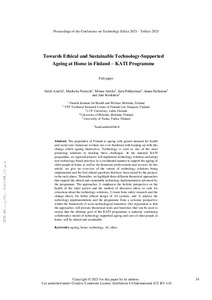Towards Ethical and Sustainable Technology-Supported Ageing at Home in Finland – KATI Programme
Anttila Heidi; Niemelä Marketta; Anttila Minna; Pekkarinen Satu; Hallamaa Jaana; Koskinen Jani
https://urn.fi/URN:NBN:fi-fe2022012710931
Tiivistelmä
The population of Finland is ageing with greater demand for health and social care; homecare workers are over-burdened with keeping up with this change whilst ageing themselves. Technology is seen as one of the most promising solutions to tackling these challenges. In the national KATI programme, six regional projects will implement technology solutions and adopt new technology-based practices in a coordinated manner to support the ageing of older people at home as well as the homecare professionals and services. In this article, we give an overview of the variety of technology solutions being implemented and the first ethical questions that have been raised by the projects in the early phase. Thereafter, we highlight three different theoretical approaches that support the ethical and sustainable technology implementation advanced by the programme. The approaches 1) emphasize the holistic perspective on the health of the older person and the method of discourse ethics to seek for consensus about the technology solutions, 2) learn from safety research and the change theory for better ethical design of AI systems, and 3) analyse the technology implementations and the programme from a systemic perspective within the framework of socio-technological transition. Our expectation is that the approaches will provide theoretical tools and heuristics that can be used to ensure that the ultimate goal of the KATI programme, a national, continuing collaborative model of technology-supported ageing and care of older people at home, will be ethical and sustainable.
Kokoelmat
- Rinnakkaistallenteet [29337]
